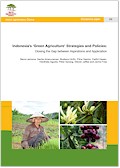| Occasional Paper |
 |
|
| Title | Indonesia's 'Green Agriculture' Strategies and Policies: Closing the gap between aspirations and application | | Author | Beria Leimona, Sacha Amaruzaman, Bustanul Arifin, Fitria Yasmin, Fadhil Hasan, Herdhata Agusta, Peter Sprang, Steven Jaffee and Jaime Frias | | Year | 2015 | | Publisher | World Agroforestry Centre (ICRAF) | | City of Publication | Nairobi | | Series Number | Occasional Paper 23 | | Number of Pages | 67 | | Call Number | OP0003-15 |
|
| Abstract: |
Indonesia's agricultural policies have recognized
the environmental, social and economic imperative
of green agriculture, and a significant portion of the
national strategy of green growth aims to reduce
agriculture’s environmental footprint. But while such
an approach is often crucial, it can be incomplete
and only generates arbitrary good practices. Thus,
a gap between aspirations and applications of
sustainable agriculture does exist.
This study provides an overview of the stateof-
the-art of green agriculture, the policies and
strategies associated with it, the commonly applied
instruments, and the situation in the field. The study
aims to capture recent findings on the following
questions: What are prominent environmental
adverse drivers and impacts of environmental
degradation associated with commercial agriculture?
What are the major features of the country’s strategy
and policy in relation to green agriculture? What
mixture of mechanisms, instruments and regulations
are being deployed by the government and private
sectors to address sustainable agriculture? What are
capacity strengths and weakness for implementing
green agriculture? And finally, what have been the
main factors contributing to the continued gap
between green aspirations and applications on the
ground?
We focus on five commodities that are particularly
important based on their competitive outlook
and the degree to which they contribute to
environmental and social risks for communities and
private enterprises. These commercially valuable
commodities are rubber, coffee, cacao, palm oil, and
rice. The first four commodities have strong global
demand, presenting both a threat for environmental
degradation and an opportunity when there is a
growing preference among a sub-set of international
consumers for sustainably grown products. Rice is a
staple food of Indonesian people with high domestic
demand. In all cases, the environmental challenges
are intertwined with social conflict, rural poverty and
livelihood uncertainty in the face of climate change
and socio-political shocks. |
|